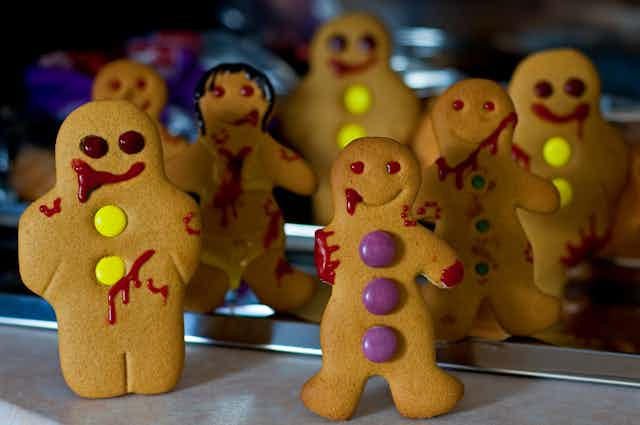This is an article from Curious Kids, a series for children. The Conversation is asking kids to send in questions they’d like an expert to answer. All questions are welcome – serious, weird or wacky!
Are zombies real? – James, aged 8, Sydney
There are lots of TV shows about zombies. Most of them are for older people and are pretty scary. Some people believe that zombies are real – but they are not really like the zombies you see in movies or on TV.
The word “zombie” is connected to folktales from Haiti. Haiti is a country on an island called Hispaniola in the Caribbean.

Folktales are tales of the folk, or the people. Folktales have been told all over the world for thousands of years. They are usually made-up stories, and are like fairy tales. But some people believe there is truth in folktales.
Hundreds of years ago, slaves from Africa were taken to Haiti and forced to work very hard on farms. They were not treated well, they didn’t get paid and they weren’t allowed to go home. These slaves told a folktale about what happened to them after they died. In the folktale, they said that a voodoo god took them from their graves and transported them back to Africa. But if they had done bad things in life, they believed they would be turned into zombies instead.
Voodoo (sometimes spelled vodou) is a religion in some parts of the world, including in Haiti. It is thought that the slaves taken to Haiti brought their beliefs in voodoo with them. People who believe in voodoo believe that there are lots of spirits in the world and more than one god, but they also believe in one main god.
One voodoo spirit is called Baron Samedi. If people upset Baron Samedi when they were alive, they risked being turned into zombies. Baron Samedi seems to be pretty scary and wears a top hat, a big black coat and sometimes has a skull for a face.

In other folktales from Haiti, zombies are believed to be created by sorcerers. The sorcerers were believed to be able to make zombies by making powders - one such potion is said to include the poison of a puffer fish. Once drunk, this poison is said to be able to make the person look and act like they were dead. The sorcerer would then use the zombie as a slave.
A bit over 100 years ago, these Haitian tales began to reach the United States. Tales of zombies were told to people and they were also printed in collections of stories about Haiti. There were also reports of zombies living in Haiti, and it was not long until American scholars and reporters began visiting Haiti in search of real zombies.
These folktales and reports about zombies have been turned into comics and horror stories. Some people love to be scared by these monsters.
So, this is the story behind zombies. From religious beliefs and folktales to reports of real-life zombies to comics, horror movies and now TV, zombies are now everywhere on our screens.
On TV shows today, there are lots of different reasons why zombies are created. Sometimes, storytellers explain that people are turned into zombies through breathing in dangerous chemicals or through catching mysterious diseases. To make these TV zombies seem extra scary, storytellers often have zombies being violent and even eating human flesh.
But remember, in such modern-day folktales, designed to frighten us, there is also a hero or heroine there to save the day.
Hello, curious kids! Have you got a question you’d like an expert to answer? Ask an adult to send your question to us. They can:
* Email your question to curiouskids@theconversation.edu.au
* Tell us on Twitter by tagging @ConversationEDU with the hashtag #curiouskids, or
* Tell us on Facebook

Please tell us your name, age, and which city you live in. You can send an audio recording of your question too, if you want. Send as many questions as you like! We won’t be able to answer every question but we will do our best.


